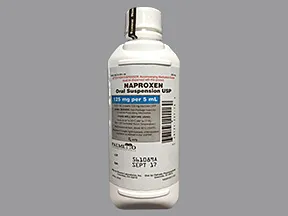No monograph available at this time.
Uses
Consult your pharmacist or physician.
How to use Naproxen Suspension, (Final Dose Form)
Side Effects
What are the most common side effects of naproxen?
The most common side effects of naproxen are listed below. Tell your healthcare provider if you have any of these side effects that bother you.
- Upset stomach or stomach pain
- Constipation or diarrhea
- Gas or heartburn
- Nausea or vomiting
- Headache
- Rash
- Bruising
- Flu-like symptoms
There may be other side effects of naproxen that are not listed here. Contact your healthcare provider if you think you are having a side effect of a medicine. In the U.S., you can report side effects to the FDA at www.fda.gov/medwatch or by calling 800-FDA-1088. In Canada, you can report side effects to Health Canada at www.health.gc.ca/medeffect or by calling 866-234-2345.
What are the serious side effects of naproxen?
While less common, the most serious side effects of naproxen are described below, along with what to do if they happen.
Heart Attack and Stroke. Naproxen can increase your risk of a heart attack or stroke that can lead to death. This risk is increased in people with existing heart disease and with longer use of naproxen and higher doses. Do not take naproxen if you have had a recent heart attack without talking to your healthcare provider. This could increase your risk of having another heart attack. Get emergency help if you have any of the following symptoms of a heart attack or stroke.
- Chest pain or pressure
- Fast or abnormal heartbeat
- Trouble breathing
- Pain in your back, jaw, throat, or arm
- Sweating, upset stomach, vomiting, or dizziness
- Sudden weakness on one side of your body
- Sudden and severe headache
- Slurred speech or trouble understanding speech
Bleeding. Naproxen can increase your risk of bleeding, especially if you have a bleeding disorder or take other medicines that increase your risk of bleeding. Tell your healthcare provider right away if you notice signs of bleeding including easy bruising or bleeding.
Stomach Bleeding. Naproxen can increase your risk of bleeding, ulcers, and tears (perforation) in your gut. The risk is higher if you have a history of stomach ulcers, bleeding problems, take higher doses of naproxen or take it for longer than directed, have poor health, are age 60 or older, have liver disease, smoke, drink alcohol, or take certain other medicines. Stop taking naproxen and get emergency help right away if you have any of the following symptoms.
- Vomit blood
- Black or tarry poop
- Stomach pain that does not go away
- Upset stomach
- Feel faint
Anemia. Naproxen may cause anemia, which is a condition that causes low levels of red blood cells. Tell your healthcare provider if you have any of the following symptoms of anemia.
- Unusual weakness or tiredness
- Cold hands and feet
- Fast or abnormal heartbeat
- Pale or yellowish skin
- Dizziness, lightheadedness, or feeling like you are about to pass out
- Shortness of breath
Liver Damage. Liver damage, also called hepatotoxicity, can happen when taking naproxen. Call your healthcare provider right away if you have any of the following symptoms of liver damage.
- Nausea or vomiting
- Stomach or belly pain
- Fever
- Weakness or unusual tiredness
- Itching
- Loss of appetite
- Light colored poop
- Dark colored urine
- Your skin or the whites of your eyes turning yellowish in color (also called jaundice)
Increased Blood Pressure (Hypertension). Naproxen may increase your blood pressure or make it worse if you have a history of high blood pressure. Call your healthcare provider if your blood pressure increases while taking this medicine.
If you measure your blood pressure and the top number (systolic) is 180 mm Hg or higher or the bottom number (diastolic) is 120 mm Hg or higher, get medical attention right away. Increases in blood pressure may not be noticeable but look out for any of the following symptoms of severely high blood pressure.
- Sudden severe headache
- Chest pain
- Dizziness or confusion
- Trouble in breathing
- Nausea/vomiting
- Blurry or other changes to vision
- Anxiety
- Buzzing in the ears
- Nosebleed
- Feeling of skipped heart beats
Heart Failure. Naproxen may increase your risk for heart failure. Tell your healthcare provider right away if you have any of the following symptoms of heart failure.
- Shortness of breath or trouble in breathing, especially while lying down
- Swelling in your feet, ankles, or legs (edema)
- Unusually fast weight gain
- Unusual tiredness
Kidney Damage. Kidney damage can happen when taking naproxen. Call your healthcare provider right away if you have any of the following symptoms of kidney damage.
- Reduced need to pee
- Swelling in your feet, ankles, or legs (edema)
- Weakness or unusual tiredness
- Difficulty in catching your breath or chest pain/pressure
- Confusion
- Nausea
- Seizures
Increased Potassium (Hyperkalemia). Naproxen can increase the potassium levels in your blood (hyperkalemia), especially if your kidneys are not working as well as they should. Mild increases in potassium may not cause any symptoms. Stop taking the medicine and get help right away if you have any of the following symptoms of sudden, severe high potassium.
- Chest pain or fast or abnormal heartbeat
- Shortness of breath
- Nausea or vomiting
- Unable to move your muscles
Severe Allergic Reactions. Naproxen can cause allergic reactions, including a specific type of allergic reaction called DRESS. DRESS stands for Drug Reaction with Eosinophilia and Systemic Symptoms. It is also sometimes called multiorgan hypersensitivity. This is a reaction that can affect multiple parts of the body, including your liver, kidneys, and heart. Stop taking the medicine and get help right away if you have any of the following symptoms of a serious allergic reaction.
- Breathing problems or wheezing
- Racing heart
- Fever or general ill feeling
- Swollen lymph nodes
- Swelling of the face, lips, mouth, tongue, or throat
- Trouble swallowing or throat tightness
- Itching, skin rash, or pale red bumps on the skin called hives
- Nausea or vomiting
- Dizziness, feeling lightheaded, or fainting
- Stomach cramps
- Joint pain
- Dark colored urine
- Your skin or the whites of your eyes turning yellowish in color (also called jaundice)
Severe Skin Reactions. Naproxen can cause severe skin reactions called exfoliative dermatitis, Stevens-Johnson Syndrome (SJS) and Toxic Epidermal Necrolysis (TEN) that can lead to death if not treated. If you develop a rash, stop naproxen and call your healthcare provider right away. Get emergency help right away if you have any of the following symptoms of a severe skin reaction.
- Painful red or purple skin that looks burned and peels off
- Flat red rash or blisters on your skin, mouth, nose, and genitals
- Red, painful, watery eyes
- Fever or general ill feeling
- Areas of thickened skin
- Sores that are crusted over
Precautions
Consult your pharmacist or physician.
Interactions
Does naproxen interact with foods or drinks?
There are no known interactions between naproxen and foods or drinks.
Drinking alcohol while taking naproxen increases your risk of stomach ulcers and bleeding. It is best to limit the amount of alcohol you drink.
Does naproxen interact with other medicines (drug interactions)?
Always tell your healthcare provider about any prescription or over-the-counter (OTC) medicines, vitamins/minerals, herbal products, and other supplements you are using.
In particular, make sure that you discuss if you are using any of the following before using naproxen.
- Any nonsteroidal anti-inflammatory drugs (NSAIDs), such as ibuprofen, and others, which are present in many prescription and OTC products for pain, swelling, and fever
- A corticosteroid, which is a medicine for certain inflammatory conditions
- Aspirin
- A blood thinner, which is a medicine used to treat or prevent blood clots
- An angiotensin-converting enzyme (ACE) inhibitor, which is a medicine for high blood pressure, heart failure, and certain kidney problems
- An angiotensin II receptor blocker (ARB), which is a medicine for high blood pressure, heart failure, and other heart conditions
- A beta-blocker, which is a medicine usually used to reduce blood pressure and for certain other heart conditions
- A selective serotonin reuptake inhibitor (SSRI) or a serotonin norepinephrine reuptake inhibitor (SNRI), which are medicines commonly used for anxiety and depression
- Cyclosporine (Gengraf, Neoral, Sandimmune, and others), which is a medicine to suppress your immune system
- A diuretic, also called a water pill, which is a medicine used to reduce edema (fluid retention) and blood pressure
- Lithium, which is a medicine for certain mental health conditions
- Pemetrexed (Alimta, Pemfexy), which is a medicine to treat certain cancers
- Digoxin, which is a medicine used to treat heart failure or certain abnormal heart rhythms
- Cholestyramine (Prevalite, Questran), which is a medicine for high cholesterol
- Probenecid, which is a medicine commonly used for gout
- An antacid that contains magnesium or aluminum
- Sucralfate, which is a medicine used for stomach ulcers
Overdose
If someone has overdosed and has serious symptoms such as passing out or trouble breathing , call 911. Otherwise, call a poison control center right away. US residents can call their local poison control center at 1-800-222-1222. Canada residents can call a provincial poison control center.
Consult your pharmacist or physician.
Images

naproxen 125 mg/5 mL oral suspension
Color: light orangeShape: Imprint:This medicine is a light orange, orange-pineapple, suspension

naproxen 125 mg/5 mL oral suspension
Color: light orangeShape: Imprint:This medicine is a light orange, orange-pineapple, suspension

naproxen 125 mg/5 mL oral suspension
Color: light orangeShape: Imprint:This medicine is a light orange, orange-pineapple, suspension
Are you currently using Naproxen Suspension, (Final Dose Form)?
This survey is being conducted by the WebMD marketing sciences department.
Selected from data included with permission and copyrighted by First Databank, Inc. This copyrighted material has been downloaded from a licensed data provider and is not for distribution, except as may be authorized by the applicable terms of use.
CONDITIONS OF USE: The information in this database is intended to supplement, not substitute for, the expertise and judgment of healthcare professionals. The information is not intended to cover all possible uses, directions, precautions, drug interactions or adverse effects, nor should it be construed to indicate that use of a particular drug is safe, appropriate or effective for you or anyone else. A healthcare professional should be consulted before taking any drug, changing any diet or commencing or discontinuing any course of treatment.